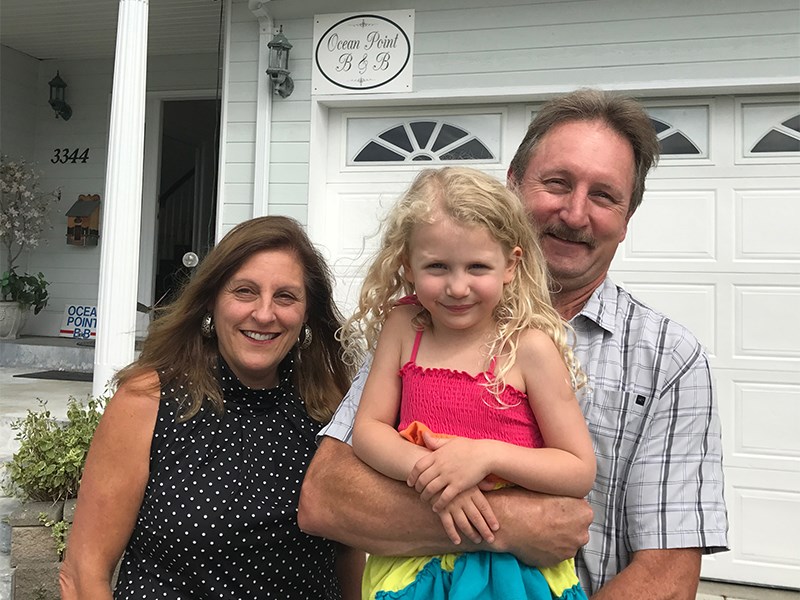For the past two years Ocean Point Bed and Breakfast, located in the quiet neighbourhood of Grief Point with its views of Malaspina Strait, has been an oddity for Powell River.
Marie Coe and her husband Marv have been running the bed and breakfast in their home since 2001. It caters to the over-50 crowd; those looking for something a little more personal than a hotel room. Although Marie has a website for Ocean Point, she does not take bookings through it, preferring to talk to her guests first.
What makes Ocean Point peculiar though is that since 2015 the business has been the only licensed bed and breakfast in the city.
A decade ago there were eight licensed bed and breakfast businesses in the city, but at the time short-term rental website Airbnb had not yet been invented.
The end for bed and breakfasts owners buying business licences with the city began in 2010, two years after the popular accommodation website launched. By 2015, Marie and Marv were the only ones left.
"It's not encouraging," said Marie. "I feel like I should be doing what everyone else is doing.”
Approximately 40 properties in the city are being advertised for short-term tourist accommodation on home-sharing websites such as Airbnb, HomeAway and VRBO (Vacation Rentals by Owner). None have business licences or pay business taxes to the city.
Marie said she feels penalized for playing by the rules. She said her business licence costs her $150 per year and she goes through the city’s safety inspections. Because Marie and Marv are running their business from their house, they pay extra property taxes for their city utilities and services.
City of Powell River mayor and business owner Dave Formosa said he feels the sharing economy has brought a return to a “wild west” mentality that has “thrown the world on its ear.”
Formosa said he does not blame people for using services such as Airbnb and Uber, but when people choose to run unlicensed businesses and put profits ahead of paying taxes it is public services such as roads, hospitals and schools that suffer.
Formosa said the city has been monitoring the number of unregistered businesses and, similar to other BC municipalities, will be developing regulations in response to them.
City director of planning Thomas Knight said he empathizes for those who go out of their way to follow local laws.
“I feel bad for all the B&B owners out there who have gone through the regulatory inspections and are finding out there’s a whole part of the industry that is getting away free,” said Knight.
Knight said there should be more regulations to even out the playing field for short-term tourist accommodations.
Formosa said the city needs to look at regulating the industry while it is still developing.
“It's more services being used by the city without any compensation to the city,” said Formosa. “We get a little bit through business licences, not a lot, but it also lets us know what's going on where, not that we're big brother.”
But creating regulations is not as simple as taking the city’s current B&B rules and applying them to the city’s short-term vacation rentals, said senior city planner Jason Gow.
For one thing, most short-term vacation rentals in Powell River are not just a spare bedroom in someone’s house, said Gow.
According to data gathered by software used by the city to track online listings, about three-quarters of the current 39 properties available are entire houses.
Airbnb public policy director Alex Dagg said the company welcomes debate about the company’s role in Powell River.
“We believe that municipalities should regulate our industry,” said Dagg. “We’re working constructively with cities across Canada toward fair and sensible home-sharing regulations.”
Gow said once staff is given direction from city council, the planning services department will create a public engagement on the issue of short-term rentals and hear what the community would like to see.
“This is a new phenomenon in the community and we want to address it the right way, in a way that addresses a broad range of community interests,” said Gow.
Dagg said the majority of Airbnb hosts in Powell River are regular people sharing their residential homes a few nights of the month in order to help make ends meet.
Knight said that despite the marked increase in Airbnb rentals during the past year, from 25 to 39, they have not caused neighbourhood conflict.
Of the 39 properties renting for short-term stays in the city, only a few are really benefiting. Only three providers had rentals of between 90 and 120 nights in the last year.
More than 75 per cent of providers earned less than $10,000 during the year while nearly 30 per cent did not earn any money. Only three per cent earned between $10,000 to $25,000.
In Powell River, how to respond to the growth of Airbnb and other short-term rental services has taken on new urgency given the shortage of long-term rentals.
While owners taking their homes off the rental market for vacation rentals is part of the issue, Royal LePage Powell River property manager Roger Pagani said a much larger factor is people taking advantage of the local real estate market and selling their rentals.
“We've lost a number of rental units just because they've gone on the market for sale,” said Pagani. ”There has been a number of units where we've unfortunately had to give notices because new owners are moving in and it has forced the tenants out.”
Renters have seen prices jump and the vacancy rate drop to under one per cent. Formosa said Powell River is now dealing with the same housing problems as larger cities.
"We have the same problems,” he said, “but just not as big.”



